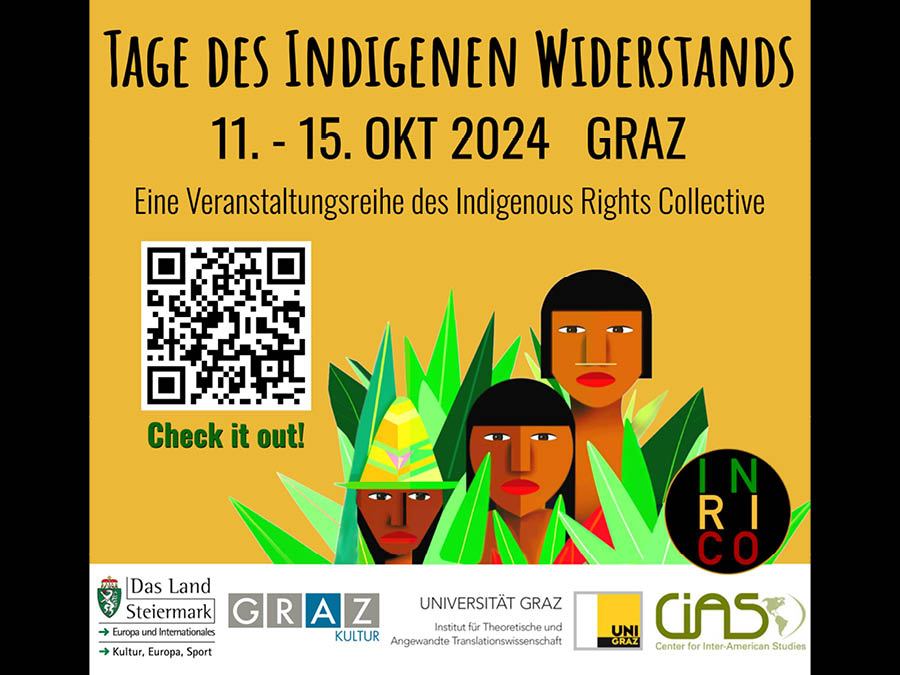Indigenous Rights Collective Radio
Tage des Indigenen Widerstands 2024
Sendetermin 12.10.2024 12:00 bis 14:00Livestream
In this two-hour broadcast, we focus on the series of events: Days of Indigenous Resistance 2024, an event organized this year together with the University of Graz, particularly with the Department of Translation Studies, the Centre for Inter-American Studies, and uni-T. The organization of this event would not have been possible without financial support from the Land Steiermark (Department of Europe and International, as well as the Department of Culture) and the City of Graz (Department of Culture). Other cooperation partners for the event include Spektral, Base Graz, Seddwell Center, Universalmuseum Joanneum, Kulturvermittlung Steiermark, Südwind Steiermark, Konak, Ibero-America Institute, Radio Helsinki, Earth Prayers, Daily Rhythms Collective, and many others.
The series of events, Days of Indigenous Resistance 2024, takes place at various venues across Graz. It offers conferences, documentaries, workshops, concerts, art installations, discussions, and a ceremony. All activities revolve around the context of historical resistance movements, current threats to Indigenous territories, and the dissemination of Indigenous knowledge.
For this radio show, we received contributions from international guests, which provide the basis for a discussion on the contemporary meaning and significance of October 12th as a Day of Indigenous Resistance. We hear voice messages from various Indigenous representatives and activists who share their perspectives on this day and the ongoing struggle of Indigenous peoples to defend their rights and cultures.
October 12, 1492, is recorded in many books as the day “America” was "discovered". However, since the land was already inhabited by Indigenous people, one could say that the only thing the Europeans discovered was that they were not alone in the world. It marked the beginning of massive expropriation, subjugation, and abuse of Indigenous peoples' rights across an entire continent, profoundly impacting human history.
However, Indigenous peoples existed not only in the Americas, and despite colonization processes on different continents, many of them have survived. Even today, they continue to resist and fight to preserve their identities, languages, lands, lifestyles, and philosophies. Thus, October 12th has become a day on which different Indigenous peoples around the world refuse to celebrate their colonization. Instead, they observe it as the Day of Indigenous Resistance.
About INRICO (Indigenous Rights Collective)
INRICO – the association for the promotion of Indigenous rights and cultures, is committed to a better future for both people and the environment. We make Indigenous communities, courageous activists, and initiatives visible, who advocate for the preservation of our planet, freedom, justice, and a good life for all.
Technical Support: Manuel A. Galvan
Moderation:
Christina Korak
Postdoctoral researcher who conducted fieldwork in Waorani communities in the Ecuadorian Amazon rainforest, which are affected by oil exploitation and deforestation. Her research focuses on translating Indigenous worldviews, and she teaches at the Department of Translation Studies and the Department of European Ethnology and Cultural Anthropology at the University of Graz. She is also active as an interpreter. Since the age of 18, she has regularly visited Latin America and is committed to combining research with efforts to improve the living conditions of Indigenous peoples. For her dissertation, she lived and conducted research from 2012 to 2013, and in 2015, in Quito, Puyo, and in Waorani and Kichwa villages in the Amazon. Her work focused on the political influences of oil companies, government organizations, and religious groups on Indigenous language use.
Guests:
Peninah Lesorogol
A representative of the Samburu people (Kenya), she grew up in Naiborkeju, a village in northern Kenya in the Great Rift Valley. She was one of the first women from her community to attend university. For many years, she has led projects that strengthen the sovereignty of Samburu women through the production of traditional handicrafts and promote agroforestry projects in their region, aimed at ensuring an autonomous food and water supply.
Roberta Maierhofer
Professor of American Studies and director of the Center for Inter-American Studies. Her research focuses on the cultural representations of material realities in terms of transregional and interdisciplinary American-European relationships, which translates to her focusing on the "how" of the "where, when, and what" in past and present contexts.
Marcela Torres Heredia
Educator, researcher, and activist from Colombia, based in Vienna. Doctoral candidate in Anthropology at the University of Vienna and participant in various collective initiatives of memory and resistance in Vienna. Her research focuses on decoloniality, feminism, socio-ecological conflicts, and intersectionality.
Ana Barón
Ana (Bogotá, Colombia) completed her undergraduate and master's degree in Applied Foreign Languages in France. Due to the strong colonization of the Muisca culture (although today there is a strong reindigenization movement), she works with indigenous friends and families from different regions of Colombia, especially from the Sierra Nevada de Santa Marta, Llanos Orientales and Amazonas (Tikuna people).

Information zur Sendereihe
Indigenous Rights Collective Radio ist die Sendung von INRICO : Verein zur Förderung indigener Rechte und Kultur in Graz. In unserer Sendung befassen wir uns mit verschiedenen Aspekten und Themen indigener Völker (weltweit). Die Sendungen werden entweder als Diskussion, als Interview oder als Bericht geführt. Gästen die eine Verbindung, Kentnisse oder Erfahrung mit indigenen Völkern haben, werden oft eingeladen um die Sendung mitzugestalten.
Manuel A. Galvan
Website: https://www.facebook.com/inricograz/
